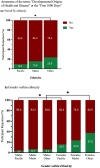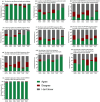Adolescent understanding of concepts related to the developmental origins of health and disease: a Pacific perspective
- PMID: 40756876
- PMCID: PMC12315215
- DOI: 10.1080/03036758.2024.2363419
Adolescent understanding of concepts related to the developmental origins of health and disease: a Pacific perspective
Abstract
The Developmental Origins of Health and Disease (DOHaD) framework has highlighted the link between an adverse early life environment and later disease risk. There is an increasing focus on adolescents as the next generation of parents as DOHaD agents of change to break the disease cycle. However, DOHaD awareness in adolescents is key to enabling knowledge uptake and behavioural change, particularly in Pacific adolescents who have a higher non-communicable disease (NCD) burden. The present study investigated understanding of DOHaD-related concepts among Pacific, Māori and other ethnic groups in New Zealand (ages 16-19 years, n = 209). Awareness of the term NCDs was low across all groups with awareness of the term DOHaD or the First 1000 Days lower in the Pacific group compared to others. Similarly, awareness of some key DOHaD concepts was low overall with some gender differences in response within ethnicity. Interestingly, adolescents' understanding that the early life nutritional environment can impact health across the life-course diminishes significantly with each advancing life-course stage. These results indicate that both education and healthcare DOHaD-related health promotion are lacking with a need for increased engagement with adolescents, particularly Pacific adolescents, to develop and communicate DOHaD content and messaging relevant to this demographic.
Keywords: DOHaD; First 1000 Days; adolescence; adolescents; non-communicable disease; pacific peoples.
© 2024 The Author(s). Published by Informa UK Limited, trading as Taylor & Francis Group.
Conflict of interest statement
No potential conflict of interest was reported by the author(s).
Figures



References
-
- Andrade CAS, Mahrouseh N, Gabrani J, Charalampous P, Cuschieri S, Grad DA, Unim B, Mechili EA, Chen-Xu J, Devleesschauwer B.. 2023. Inequalities in the burden of non-communicable diseases across European countries: a systematic analysis of the Global Burden of Disease 2019 study. International Journal for Equity in Health. 22(1):140. doi: 10.1186/s12939-023-01958-8. - DOI - PMC - PubMed
-
- Bay J, Mora H, Sloboda D, Morton S, Vickers M, Gluckman P.. 2012. Adolescent understanding of DOHaD concepts: a school-based intervention to support knowledge translation and behaviour change. Journal of Developmental Origins of Health and Disease. 3(6):469–482. doi: 10.1017/S2040174412000505. - DOI - PubMed
-
- Bay J, Yaqona D, Barrett-Watson C, Tairea K, Herrmann U, Vickers M.. 2017. We learnt and now we are teaching our family. Journal of Developmental Origins of Health and Disease. 8(Suppl 1):s152–s152.
LinkOut - more resources
Full Text Sources
